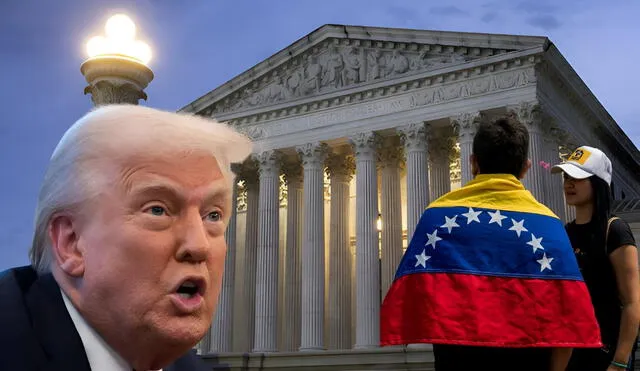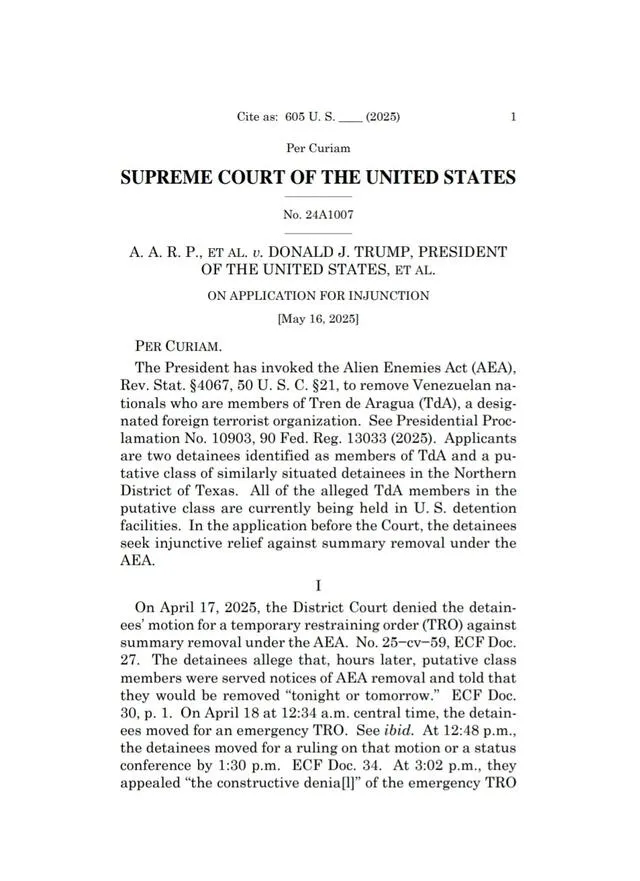Supreme Court blocks Trump’s attempt to deport Venezuelan Migrants under Alien Enemies Act
In a landmark ruling, the Supreme Court halts Trump’s controversial bid to deport Venezuelan migrants using a centuries-old wartime law — setting the stage for a fierce legal battle over civil liberties, immigration rights, and presidential power.

The U.S. Supreme Court stopped the Trump administration's effort to quickly deport Venezuelan migrants under the 1798 Alien Enemies Act. The Court ruled nearly unanimously that the migrants were entitled to some due process and that giving just 24 hours' notice, when the migrants had limited information to flesh out a challenge to deportation, violated their constitutional rights. This ruling preserves an earlier ruling in April and requires that the migrants stay in the U.S. while lower courts decide the appropriate procedural due process for notice of deportation.
The Trump administration used the Alien Enemies Act, a wartime law, as a reason for the deportations of suspected members of the Venezuelan gang Tren de Aragua. However, the Supreme Court did not provide any ruling on the legality of deporting people with this act; rather, the focus was on the weaknesses in the administration's process. The case will be sent back to the Fifth Circuit Court of Appeals to decide what due process rights the detainees have.
Supreme Court blocks Trump’s deportation plan, citing Constitutional Rights
The Court shouldn't intervene before the lower courts ruled on the merits. They stated that the Supreme Court shouldn't take action on the case at this stage and questioned the authority of the Supreme Court to intervene. Regardless, the majority of the Court said it is critical to maintain constitutional protections for all individuals, no matter their immigration status.
The ruling creates a significant impact on the Trump administration's immigration policy, particularly its use of wartime laws to expedite deportations. Opponents of this agenda claimed the measures circumvent fundamental protections and set a new standard. The Trump administration's agenda has faced extensive legal action, highlighting the conflict between national security and individual rights.
Supreme Court decision on Alien Enemies Act sparks debate over Immigration enforcement and Civil Liberties
Human rights organizations have lauded the Supreme Court's ruling, viewing it as an affirmation of due process rights. They argue that the application of the Alien Enemies Act in this case was not appropriate and interfered with legal protections for individuals who had been ordered removed from the United States. The case also highlights the broader conversation surrounding immigration enforcement and constitutional protections.

In a 7–2 decision, the Supreme Court delivers a major blow to the Trump administration’s efforts to deport Venezuelan detainees under the Alien Enemies Act, emphasizing the need for due process and fair notice. Photo: X
With the case returning to the lower courts, it will be closely monitored by the legal community and the general public. The outcome could shape immigration policies moving forward and the extent to which the government is able to utilize old statutes in relation to contemporary issues. The Supreme Court's decision represents a key moment in the continuing immersion of immigration law and civil liberties in the United States.













